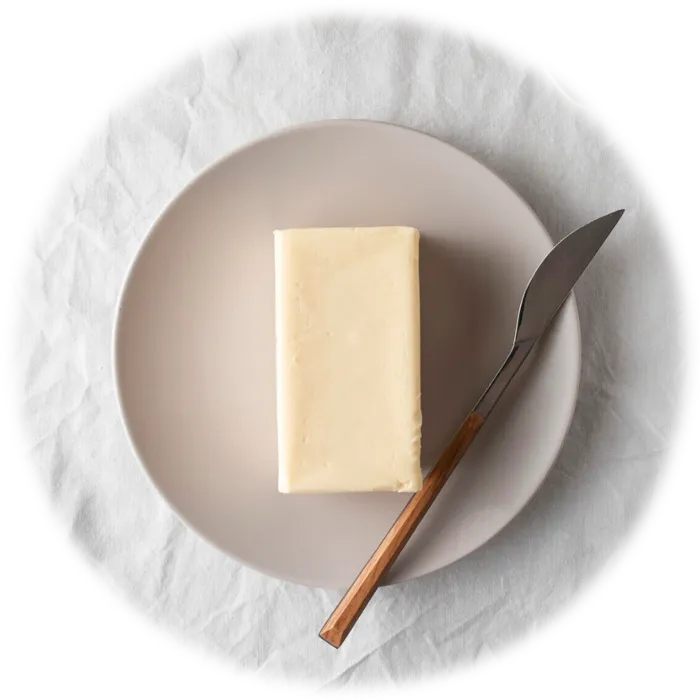
Nutritional properties of Vegetable Butter
Energy :
900.00 Kcal / 100g
Category : Oils and Fats
Group : Vegetable Oils & Fats
Composition And Nutritional Value :Vegetable butter is a plant-based alternative to traditional dairy butter, made primarily from oils derived from plants such as palm, coconut, canola, or soy. It is composed of a blend of unsaturated and saturated fats, with the exact composition depending on the oil sources used. Vegetable butter may be enriched with additional ingredients like lecithin for emulsification and vitamins such as A and D. Some varieties are made with a higher percentage of unsaturated fats, such as those found in sunflower or olive oil, while others may contain a significant amount of saturated fats from coconut or palm oil. Vegetable butter provides essential fatty acids, including omega-3 and omega-6, but should be consumed in moderation due to its high fat content.
Health Benefits : Vegetable butter can offer some health benefits when compared to traditional dairy butter, especially for individuals who follow plant-based or vegan diets. The presence of unsaturated fats in vegetable butter, particularly those from oils like olive or canola oil, can help improve heart health by lowering LDL (bad) cholesterol levels and boosting HDL (good) cholesterol levels. Additionally, plant-based butters that are free from dairy provide a cholesterol-free option for those at risk of cardiovascular disease. However, some vegetable butters, especially those containing high amounts of coconut or palm oil, are high in saturated fats, which can contribute to increased cholesterol levels and should be consumed in moderation for a balanced diet.
Culinary Uses : Vegetable butter is a versatile ingredient used in the same way as dairy butter in cooking and baking. It can be used for sautéing, frying, and greasing pans, as well as in recipes like cookies, cakes, and pastries, where it helps provide a rich, creamy texture. Due to its plant-based nature, vegetable butter is a popular choice for vegans and those with dairy allergies. It can also be used in savory dishes, such as vegetable-based sauces or spreads for bread and crackers. Some varieties of vegetable butter are flavored with herbs or garlic to enhance their culinary applications. When substituting vegetable butter for dairy butter, a 1:1 ratio is typically used.
Types : There are many different types of vegetable butter, with each variety depending on the type of oils used and whether any additional flavors or nutrients are added. Common types include sunflower butter, canola butter, and coconut butter. Some vegetable butters are made with a single type of oil, while others use a blend of oils to achieve a desired texture and flavor. Vegan butters may also be fortified with vitamins A and D to mimic the nutritional content of dairy butter. The texture and consistency of vegetable butter can vary, with some being spreadable at room temperature while others may require refrigeration to maintain their solid form.
Shopping And Storage Tips : When shopping for vegetable butter, consider your dietary preferences and cooking needs. Look for varieties made with healthy unsaturated oils, such as olive or sunflower oil, for a more heart-healthy option. Be cautious of vegetable butters with high levels of palm or coconut oil, as these oils are high in saturated fats. If you're looking for additional flavor, choose vegetable butters that are infused with herbs or spices. Always check labels for added preservatives or artificial ingredients. Store vegetable butter in a cool, dry place, and refrigerate it for longer shelf life. If the butter is made from oils like coconut oil, it may solidify at cooler temperatures but will soften when brought to room temperature.

